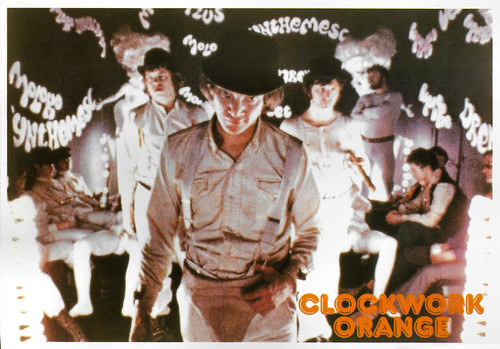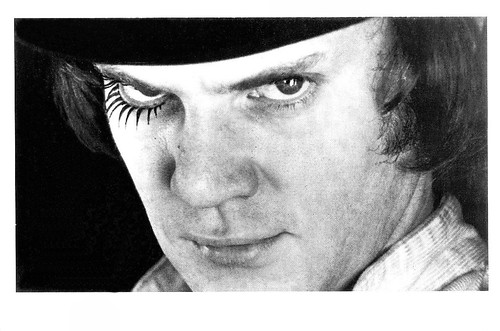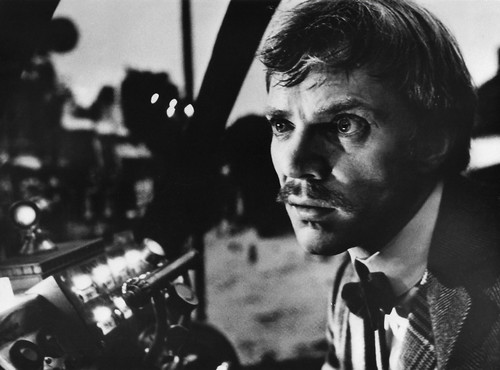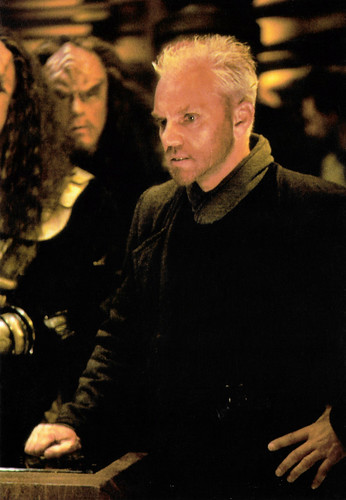
Vintage postcard by Memory Card, no. 475. Malcolm McDowell, Warren Clarke, Paul Farrell, Michael Tarn and James Marcus in A Clockwork Orange (Stanley Kubrick, 1971).

British postcard by Paramount Pictures for the DVD release (2007), no. GI101327PK. Photo: Paramount Pictures. Malcolm McDowell in If... (Lindsay Anderson, 1968).

Vintage photo. Malcolm McDowell and Alan Bates in Royal Flash (Richard Lester, 1975).

German press photo by UIP Filmverleih, no. P3. Malcolm McDowell in Cat People (Paul Schrader, 1982).

American postcard by Classico San Francisco, no. 105-350. Photo: Paramount Pictures. Malcolm McDowell in Star Trek - Generations (David Carson, 1994).
A juvenile criminal who ends up killing
Malcolm McDowell was born Malcolm John Taylor in Horsforth in the City of Leeds, West Yorkshire, Great Britain, in 1943. He was the eldest of three children of Edna McDowell and Charles Taylor. After him, his sisters Gloria and Judy were born. Father Taylor was an RAF officer and moved to Bridlington with his family. They then moved to Liverpool, where McDowell grew up and as a teenager took a job in a Planters nut factory in nearby Aintree, as well as working at his father's pub, The Bull and Dog, in Burscough, Lancashire.
Malcolm attended a public school in England from the age of 11. At school, he was beaten with a slipper or cane every Monday for his wayward behaviour. There he decided that he wanted to become an actor, and studied acting at the London Academy of Music and Dramatic Arts (LAMDA). Meanwhile, he worked at his parents' pub but lost his job when the pub went bankrupt. His alcoholic father drank all the profits. He then had a variety of jobs, from coffee salesman to messenger. McDowell gained experience as an actor as an extra with the Royal Shakespeare Company.
His first film role was in the first feature-length film from director Ken Loach, Poor Cow (Ken Loach, 1967) with Terence Stamp, but his scene was eventually cut from the film. Moving to New York, McDowell met director Lindsay Anderson and appeared in his off-Broadway production of 'Look Back in Anger'. After this, Anderson selected him to star as Mick Travis, the rebellious boarding school student in If... (Lindsay Anderson, 1968). In this film, Mick, along with two fellow students, ends up taking the parents and teachers under fire with automatic weapons. As he wanted to get into the SAG, the British Actors' Equity, he took his mother's maiden name McDowell because there was another British actor called Malcolm Taylor.
While McDowell played roles in two other films, If.... premiered. Director Stanley Kubrick who was looking for the lead actor for his film A Clockwork Orange (1971), based upon the novel by Anthony Burgess, was very interested in McDowell. The role of Alex DeLarge is that of a psychopath, a juvenile criminal who ends up killing. The nervous McDowell, who was unsure how to play Alex, asked Lindsay Anderson for advice on how to fill his role at the audition. Anderson advised McDowell to stay close to the role of Mick Travis with his mean smile. Kubrick was deeply impressed and gave McDowell the role of Alex. The portrayal of the role of Alex earned McDowell a Golden Globe nomination. In his All Movie review, Mark Deming notes: "For all its horrific violence and troubling moral ambiguity, it is ultimately a satire, and, like Dr. Strangelove, it wrings a shocking amount of humor from situations that few people would think of as funny. With the notable exception of Alex (Malcolm McDowell in the best performance of his career), most of the characters are little more than cartoons (with dialogue to match), while a great deal of the violence walks a fine line between Looney Tunes absurdity and crushingly vivid brutality."
After the success of A Clockwork Orange, McDowell received several offers. He again chose director Lindsay Anderson and made the semi-autobiographical O Lucky Man! (1973) with him, a film based on suggestions by McDowell. In 1982, he collaborated with Anderson for the third time in Britannia Hospital (Lindsay Anderson, 1982). In the 1970s, he also starred frequently in British television productions, mostly adaptations of plays such as The Collection (1976) with Laurence Olivier. He also featured in British films such as the adventure satire Royal Flash (Richard Lester, 1975), the WWI drama Aces High (Jack Gold, 1975), the disaster film Voyage of the Damned (Stuart Rosenberg, 1976) with Faye Dunaway and the TV film She Fell Among Thieves (Clive Donner, 1977). Pedro Borges at IMDb: "In early 1976, he spent nearly a year working on what would later be one of the most infamous films of all time, the semi-pornographic Caligula (Tinto Brass, 1979), financed by Penthouse magazine founder Bob Guccione. Around that time, the British film industry collapsed, forcing him to flee to America to continue working."

British postcard by Paramount Pictures for the DVD release (2007), no. GI101327PK. Photo: Paramount Pictures. Poster for If... (Lindsay Anderson, 1968).

Vintage postcard. Malcolm McDowell in A Clockwork Orange (Stanley Kubrick, 1971).

French postcard. Malcolm McDowell, Warren Clarke, Michael Tarn and James Marcus in A Clockwork Orange (Stanley Kubrick, 1971).

Vintage postcard by Memory Card, no. 690. Malcolm McDowell, Warren Clarke, Michael Tarn and James Marcus in A Clockwork Orange (Stanley Kubrick, 1971).

Vintage postcard by Memory Card, no. 473. Malcolm McDowell, Warren Clarke, Paul Farrell, Michael Tarn and James Marcus in A Clockwork Orange (Stanley Kubrick, 1971).
Still commanding the screen
Malcolm McDowell played the role of British writer H.G. Wells in Time After Time (Nicholas Meyer, 1979). It was his first American film. During this production, he met his second wife, actress Mary Steenburgen. He divorced his first wife, Margot Bennett, in 1980 and married Steenburgen. He made his mark in some good films like the action thriller Blue Thunder (John Badham, 1983) in which he played the repulsive helicopter pilot F.E. Cochrane. He played opposite Nastassja Kinski in the supernatural Horror film Cat People (Paul Schrader, 1982) and parodied Rolling Stones singer Mick Jagger in Get Crazy (Allan Arkush, 1983).
In the mid-1980s, the years of alcohol and drug abuse, including $1000 a week on cocaine, took its toll on him. His black hair was now grey. Looking older than he was, nobody wanted to cast him for playing younger roles. The big roles having dried up, he did many B-films, many of which did not even make it to cinemas. This damaged McDowell's reputation as an artist.
In the 1990s, McDowell overcame his alcohol addiction. He divorced Mary Steenburgen and in 1991, he married Kelley Kuhr, twenty-four years younger. In 1994, he played Dr. Tolian Soran, in Star Trek: Generations (David Carson, 1994), a role that put him back on the map. Dr Soran is a mad scientist who murders the beloved Captain Kirk. Meanwhile older and more content with himself, McDowell played such diverse films as The Player (Robert Altman, 1992) and the post-apocalyptic Science-Fiction film Tank Girl (Rachel Talalay, 1995). He also collaborated on an episode of the animated series South Park (2000). He was the first well-known actor to appear in the flesh in a South Park parody of Charles Dickens's classic 'Great Expectations', playing the narrator and simply calling himself "A British Person".
McDowell continued his career in the 21st century. In Robert Altman's drama The Company (Robert Altman, 2003), he played the director of the Joffrey Ballet. He was a man who took the law into his own hands in I'll Sleep When I'm Dead (Mike Hodges, 2003) starring Clive Owen. He remained active in television productions, playing roles in Law & Order: Criminal Intent, Heroes and Masters of Science Fiction on Sky. He played Dr. Samuel Loomis in the remake of Halloween (Rob Zombie, 2007) and its sequel, Halloween II (Rob Zombie, 2009). He made a brief but memorable performance in the award-winning French film The Artist (Michel Hazanavicius, 2011), a comedy-drama film in the style of a silent film. It was nominated for ten Academy Awards and won five, including Best Picture.
His performance proved that even without so much as a line of dialogue, McDowell still had the charisma to command the screen. He played Rupert Murdoch in the American drama Bombshell (Jay Roach, 2019) with Charlize Theron, Nicole Kidman, and Margot Robbie. The film was based on the accounts of the women at Fox News who set out to expose CEO Roger Ailes for sexual harassment. McDowell has played Patrick "Pop" Critch on the Canadian series Son of a Critch since 2022. Malcolm McDowell has five children and a granddaughter. He has two children with Mary Steenburgen, Lilly (born 1981) and filmmaker Charlie McDowell (1983). He has three sons with his wife Kelley McDowell: Beckett Taylor McDowell (2004), Finnian Anderson McDowell (2006), and Seamus Hudson McDowell (2009). In 2021, McDowell announced that he had become an American citizen.

Chinese postcard. Michael Bates and Malcolm McDowell in A Clockwork Orange (Stanley Kubrick, 1971).

Vintage press photo. Malcolm McDowell in Royal Flash (Richard Lester, 1975).

Vintage press photo. Malcolm McDowell and director Richard Lester on the set of Royal Flash (Richard Lester, 1975).

German press photo by ORF Fotodienst, 1986. Malcolm McDowell and Mary Steenbergen in Time After Time (Nicholas Meyer, 1979).

German press photo. Photo: Warner Bros. / Orion. Malcolm McDowell in Time After Time (Nicholas Meyer, 1979).

American postcard by Classico San Francisco, no. 105-364. Photo: Paramount Pictures. Malcolm McDowell in Star Trek - Generations (David Carson, 1994).
Sources: Pedro Borges (IMDb), Mark Deming (AllMovie), AllMovie, Wikipedia (Dutch and English) and IMDb.
No comments:
Post a Comment